人教八下 Unit 9 Have you never been to a musement (Section B 1a-1d)(共15张PPT)
人教版8下英语 Unit 9 Have you ever been to an amusement park Reading

animals
→ lions, tigers, foxes
seasons
→
→
summer, spring, autumn, winter
languages
Chinese, Putonghua, English
kinds of food
→
rice, noodles, dumplings, Indian/Western/Japanese food
Secti3a. Complete the word map with the words from the reading.
names of places
→
China, Singapore, Southeast Asia, zoo, Night Safari
night when they are awake. _________________________
4. It's best to visit Singapore in autumn. You can visit Singapore at any time _______________________________ of year/ in any season. ___________________
Fill in the blanks: Why is the zoo so special?
1. Singapore has a special zoo called __________________. the “Night Safari” 2. A lot of animals _________ at night, so wake up this is _____________ to watch them. the best time 3. At the zoo, you can watch lions, tigers, and
Unit9 sectionA重要知识点讲解课件人教版八年级英语下册
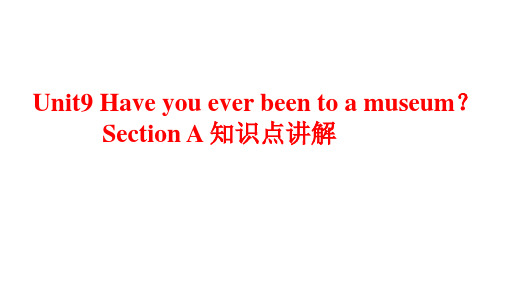
Jennifer likes to listen to music; so do I.
10.“so + 主语+动词”,这一结构用来表示对上文情况给 予进一步的肯定或确认。
---It was cold yesterday.昨天很冷。 ---So it was.确实是这样。
--- The students study hard.学生们学习很努力。 ---So they do.他们确实很努力。
--- He went to Shanghai yesterday.他昨天去北京了。 ---So he did.他确实去了。
1.— Have you ______ been to Xiamen? — No, ___A_____.
使用这一结构应注意以下几点: 一、注意结构中and 与标点符号的使用。 这一结构是一个完整的倒装句,因此,若前一句用句号,则so 应大写第一个字母。
Jennifer likes to listen to music. So do I.
若前一句用逗号,则so 前须加and,构成并列分句; Jennifer likes to listen to music, and so do I.
当前面的陈述句中有否定词few, little, never, no, nobody, hardly, seldom等词时,其后的简短疑问句应用肯定形式。 He can hardly swim, __ca_n__h_e_?
We have a little water, _d_o__w_e__?
以let’s开头的反义疑问句,简短疑问句部分用shall we;以let us 开头的反义疑问句,简短疑问部分用will you.
人教新目标英语八年级下册讲义—Unit 9 Have you ever been to a ……

新目标八年级下册Unit 9 Have you ever been to a museum ?讲义一、重点单词1. amusement n. 娱乐; 游戏2. somewhere adv. 在某处; 到某处3. camera n. 照相机; 摄影机; 摄像机4. invention n. 发明物5. invent v. 发明; 创造1. unbelievable adj. 难以置信的; 不真实的2. progress n. 进步; 进展3. rapid adj. 迅速的; 快速的4. unusual adj. 特别的; 不寻常的5. toilet n. 坐便器; 厕所6. encourage v. 鼓励7. social adj. 社会的8. peaceful adj. 和平的; 安宁的9. performance n. 表演; 演出10. perfect adj. 完美的; 完全的11. itself pron.(it的反身代词) 它自己12. collect v. 收集; 采集13. German adj. 德国的; 德语的; 德国人的n. 德语; 德国人14. theme n. 主题15. ride n. 供乘骑的游乐设施; 短途旅程16. province n. 省份17. simply adv. 仅仅; 只; 不过18. fear v. & n. 害怕; 惧怕19. whether conj. 不管......;还是); 或者......(或者); 是否20. Indian adj.印度的 n. 印度人21. Japanese adj.;日本的; 日本人的; 日语的n. 日本人; 日语22. equator n. 赤道23. whenever conj. 在任何......时候; 无论何时24. spring n. 春天25. mostly adv. 主要地; 通常26. location n. 地点; 位置二、短语归纳1.at night在夜晚2.in a more natural environment在一个更加自然的环境中3.all year round 全年4.be far from 离……远5.in the dark 在黑暗中6.in the past 在过去7.have been to sp. 去过某地8.science museum 科学博物馆9.history museum 历史博物馆10.amusement park 游乐园11.go somewhere different 去不同的地方12.go skating 去滑冰13.take the subway 坐地铁14.a great way to spend a Saturday afternoon一个过周六下午的好方法15.all the old movie cameras所有的古老的电影摄影机16.learn about sth.解有关……的情况17.on the weekend 在周末18.camp in the mountains 在大山里露营19.put up a tent搭帐篷20.in such a rapid way 以如此迅猛的方式21.different kinds of各种各样的22.development of toilets 厕所的发展23.social groups 社会团体24.the tea art performances茶艺表演25.make a perfect cup of tea with beautiful tea sets用漂亮的茶具沏一杯完美的茶26.a nice place to enjoy tea 一个品茶的好地方27.thousands of 数以千计的28.International Museum of Toilets国际厕所博物馆29.the Terracotta Army 兵马俑30.Southeast Asia东南亚31.Night Safari 夜间动物园32.three quarters 四分之三33.an English-speaking country一个讲英语的国家34.have problem doing sth. 做某事很困难35.during the daytime在白天36.a couple of times 好几次37.right now 现在;目前38.an amusement park with a special theme一个有特别的主题的游乐园39.walk around the park 在公园里到处走40.hear of 听说41.take a ride兜风42.another province另一个省43.the Bird’s Nest鸟巢44.encourage sb. to do sth.鼓励某人做某事45.on the one hand... on the other hand.一方面,另一方面三、句型集萃1.a great way to do sth一个做某事的好办法2.It’s unbelievable that很难相信……3.watch sb do sth.看某人做了某事4.encourage sb to do sth鼓励某人做某事5.as..as和。
(人教新目标)八年级英语(下)短语语法知识点汇总Unit9
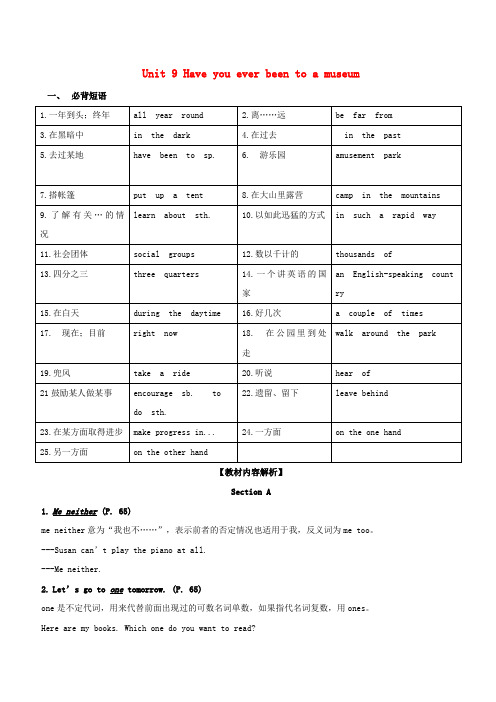
Unit 9 Have you ever been to a museum 一、必背短语【教材内容解析】Section A1.Me neither (P. 65)me neither意为“我也不……”,表示前者的否定情况也适用于我,反义词为me too。
---Susan can’t play the piano at all.---Me neither.2.Let’s go to one tomorrow. (P. 65)one是不定代词,用来代替前面出现过的可数名词单数,如果指代名词复数,用ones。
Here are my books. Which one do you want to read?---I don’t like these dresses.---How about those ones over there.3.Let’s go somewhere different today. (P. 65)somewhere用作副词,表示“在某处、到某处”,常用于肯定句中,在否定句和疑问句中用anywhere。
It’s cold here. Let’s go somewhere else.Did you go anywhere last Sunday?4.They are going to take the subway. (P. 66)take the subway意为“乘地铁”,take用作动词,可以表示“乘、坐(车、船等)”。
We take the subway to work every day.5.It’s a great way to spend a Saturday afternoon. (P. 66)(1) way表示“方法”时,后常接动词不定式或者of doing作定语。
Can you think out a way to open the door/of opening the door?(2) spend的用法① sb. spend+时间/金钱+on sth. “在某事上花费多长时间或者多少钱”The man spent the whole day on his speech.The family spent 10,000 dollars on their trip.② sb. spend+时间+(in) doing sth. “花费多长时间做某事”The boy has spent two hours playing the computer games.【拓展】辨析spend, pay, take和cost6.We put up a tent and cooked outside. (P. 66)put up意为“搭建”,还可以表示“举起、张贴”。
人教新目标版2019中考英语八下Unit9Haveyoueverbeentoamuseum阅读练习及答案
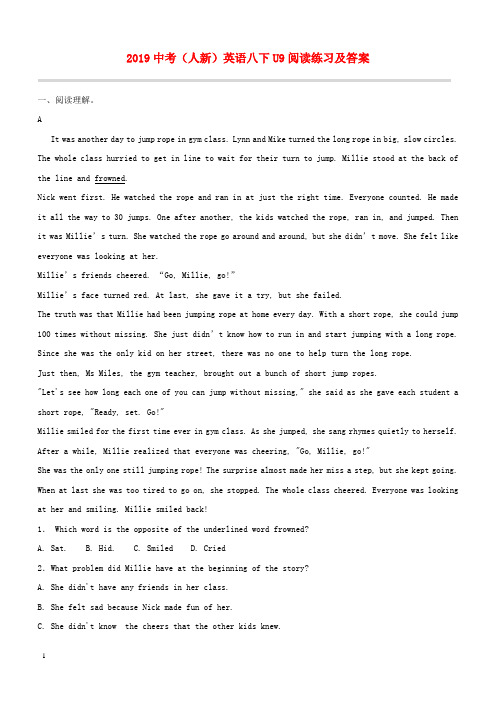
2019中考(人新)英语八下U9阅读练习及答案一、阅读理解。
AIt was another day to jump rope in gym class. Lynn and Mike turned the long rope in big, slow circles. The whole class hurried to get in line to wait for their turn to jump. Millie stood at the back of the line and frowned.Nick went first. He watched the rope and ran in at just the right time. Everyone counted. He made it all the way to 30 jumps. One after another, the kids watched the rope, ran in, and jumped. Then it was Millie’s turn. She watched the rope go around and around, but she didn’t move. She felt like everyone was looking at her.Millie’s friends cheered. “Go, Millie, go!”Millie’s face turned red. At last, she gave it a try, but she failed.The truth was that Millie had been jumping rope at home every day. With a short rope, she could jump 100 times without missing. She just didn’t know how to run in and start jumping with a long rope. Since she was the only kid on her street, there was no one to help turn the long rope.Just then, Ms Miles, the gym teacher, brought out a bunch of short jump ropes."Let's see how long each one of you can jump without missing," she said as she gave each student a short rope, "Ready, set. Go!"Millie smiled for the first time ever in gym class. As she jumped, she sang rhymes quietly to herself. After a while, Millie realized that everyone was cheering, "Go, Millie, go!"She was the only one still jumping rope! The surprise almost made her miss a step, but she kept going. When at last she was too tired to go on, she stopped. The whole class cheered. Everyone was looking at her and smiling. Millie smiled back!1. Which word is the opposite of the underlined word frowned?A. Sat.B. Hid.C. SmiledD. Cried2.What problem did Millie have at the beginning of the story?A. She didn't have any friends in her class.B. She felt sad because Nick made fun of her.C. She didn't know the cheers that the other kids knew.D. She didn't know how to start jumping with a long rope.3. Why did Millie smile for the first time in gym class?A. She did something well at last.B. She knew the class would cheer for her.C. She thought that she was going to make a friend.D. She believed that she would be the winner of the contest.4.Which sentence can be put in the empty?A. The class decided to play baseball.B. Millie was the last one still jumping rope.C. Nick won the rope-jumping contest.D. Millie tried to hide in the back of the line.5.How might Millie feel when she stopped jumping at last?A. Proud.B. Bored.C. Mad.D. Silly.【答案】1.C 2.D 3.A 4.B 5.A【解析】试题分析:这篇短文讲述的是Millie的一节体育课,老师让学生们跳长绳,Millie不知道怎样跳,她试了一次,但是失败了。
人教新目标八年级英语下册Unit9 Have you ever been to a museum-单元练习【含答案】
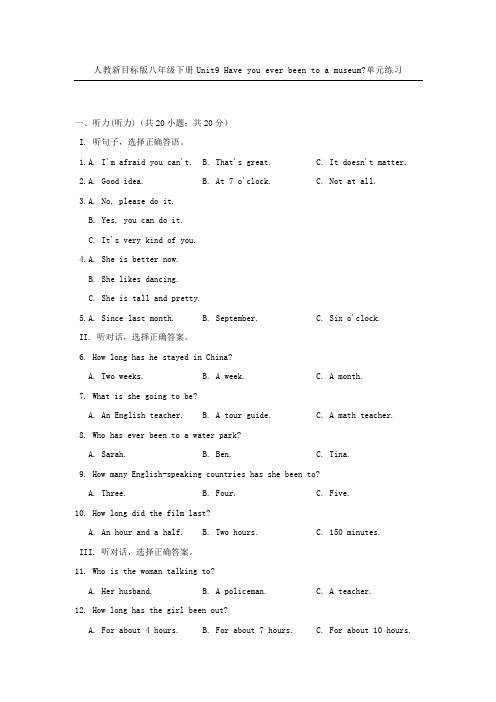
人教新目标版八年级下册Unit9 Have you ever been to a museum?单元练习一、听力(听力)(共20小题;共20分)I. 听句子,选择正确答语。
1. A. I'm afraid you can't. B. That's great. C. It doesn't matter.2. A. Good idea. B. At 7 o'clock. C. Not at all.3. A. No, please do it.B. Yes, you can do it.C. It's very kind of you.4. A. She is better now.B. She likes dancing.C. She is tall and pretty.5. A. Since last month. B. September. C. Six o'clock.II. 听对话,选择正确答案。
6. How long has he stayed in China?A. Two weeks.B. A week.C. A month.7. What is she going to be?A. An English teacher.B. A tour guide.C. A math teacher.8. Who has ever been to a water park?A. Sarah.B. Ben.C. Tina.9. How many English-speaking countries has she been to?A. Three.B. Four.C. Five.10. How long did the film last?A. An hour and a half.B. Two hours.C. 150 minutes.III. 听对话,选择正确答案。
人教新目标八年级下册unit9全单元知识点

Unit 9 Have you ever been to a museum 1.with beautiful tea sets用美丽的茶具沏一杯完备的茶2. a nice place to enjoy tea 一个品茶的好地方3.thousands of 数以千计的4.International Museum of Toilets国际厕所博物馆5.the Terracotta Army 兵马俑6.Southeast Asia东南亚7.Night Safari 夜间动物园8.three quarters 四分之三9.an English-speaking country一个讲英语的国家10.have problem doing sth. 做某事很困难11.during the daytime在白天12. a couple of times 好几次13.right now 如今;目前14.an amusement park with a special theme一个有特殊的主题的游乐园15.walk around the park 在公园里到处走16.hear of 听说17.take a ride兜风18.another province另一个省19.the Bird’s Nest鸟巢20.encourage sb. to do sth.激励某人做某事21.on the one hand... on the other hand.一方面,另一方面1. Have you ever been to...Have you ever been to a science museum你曾经去过科学博物馆吗?2. Let’s. 。
Let’s go somewhere different today.我们今日去个不同的地方吧。
3. It’s~\~adj. +that...It9 s unbelievable that technology has progressed in such a rapid way!科技以如此迅猛的方式开展真是令人难以置信啊!4. Whether... , you,11...Whether you like Indian food,Western food or Japanese food, you’ll find it all in Sin gapore!不管你喜爱印度食品、西方食品还是日本食品,在新加坡你都能找到!5. One great thing. . is that. .One great thing about Singapore is that the temperature is almost the same all year round.新加坡一个很大的特征是它的气温几乎一年到头都是一样的。
人教版 八年级英语 下册 Unit_9_Have_you_ever_been_to_a_museum

dish.
Tapescripts:
Boy 1: So, Peter, how long have you been in China? Peter: I’ve been here for two weeks, but I’m going back to Australia tomorrow. Boy 1: Have you traveled much? Peter: Yes, I have. I’ve seen many interesting things. Boy 1: Have you visited the Palace Museum? Peter: Yes, I have. I went there last week. It was wonderful. There were so many beautiful treasures. Boy 1: And have you been to the Great Wall?
1st listening
1b
Listen to a student interviewing a foreign student. Check (√) the questions you hear.
___√_ Have you visited the Palace Museum?
___√_ Have you been to the Great Wall?
人教版英语八下词汇精讲--Unit9

Unit9 Have you ever been to a museum?1. amusement n. 娱乐;游戏同义词:please v. 取悦......entertainment n. 娱乐entertain v. 娱乐amuse v. 消遣,逗笑;使开心,使愉快amusing adj. 有趣的,好玩的,好笑的amused adj. 被逗乐的;感到好笑的2.amusement park 游乐场e.g. The amusement park is open from May through October.游乐园从五月到十月开放。
3.somewhere adv. 在何处;到某处pron. 某个地方e.g. Maybe the keys are somewhere in the dining room.也许钥匙在餐厅某个地方。
I need to find somewhere to stay tonight.我得找到今晚要住的地方。
anywhere adv. 任何地方nowhere adv. 无处;哪里都不everywhere adv. 到处4.camera n.照相机;摄影机;摄像机e.g. I heard your parents bought you a cameras as a gift.我听说你的父母亲给你买了一台照相机作为礼物。
digital camera 数码相机5.invention n.发明;发明物e.g. Do you think mobile phone is a great invention?你认为手机是一个伟大的发明吗?6.invent v.发明;创造inventor n.发明家invention n.发明;发明物e.g. As we all know that Edison invented light bulb.我们都知道爱迪生发明了灯泡。
以-tion结尾:celebrate-celebrationcollect-collectioncommunicate-communicationcongratulate-congratulation donate-donationeducate-educationintroduce-introductionorganize-organizationdecide-decisionpollute-pollutionprotect-protectionsuggest-suggestiondirect-director-directioninvent-inventor-invention以-er结尾:dance-dancerdesign-designerdrive-driverlead-leaderrun-runnersinger-singerspeak-speakertravel-travelerworker-workerwin-winnerwait-waiter-waitressact-actor-actress7. unbelievable adj. 难以置信的;不真实的unbelievably adv. 难以置信地;不真实地unbelievably bad/good 坏得/好得令人难以置信incredible adj. 难以置信的e.g. I still find this story both fascinating and unbelievable.我仍然觉得这个故事非常有趣和难以置信。
人教版八年级英语下册Unit9 Have you ever been to a museum知识点梳理及单元复习
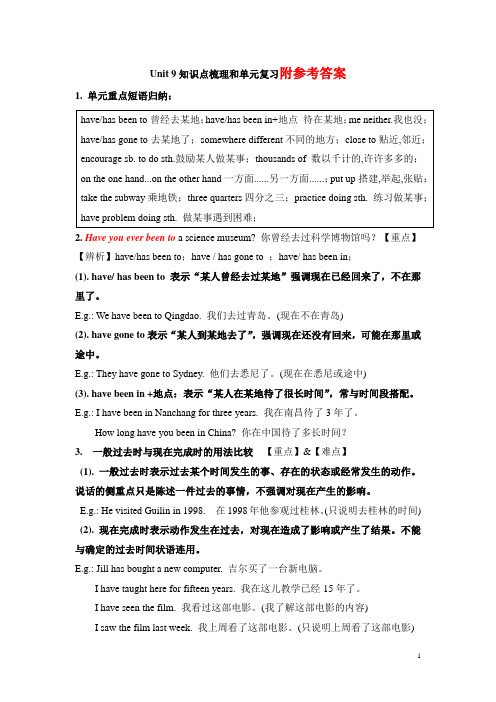
Unit 9知识点梳理和单元复习附参考答案1. 单元重点短语归纳:have/has been to曾经去某地;have/has been in+地点待在某地;me neither.我也没;have/has gone to去某地了;somewhere different不同的地方;close to贴近,邻近;encourage sb. to do sth.鼓励某人做某事;thousands of 数以千计的,许许多多的;on the one hand...on the other hand一方面......另一方面......;put up搭建,举起,张贴;take the subway乘地铁;three quarters四分之三;practice doing sth. 练习做某事;have problem doing sth. 做某事遇到困难;2. Have you ever been to a science museum? 你曾经去过科学博物馆吗?【重点】【辨析】have/has been to;have / has gone to ;have/ has been in;(1). have/ has been to 表示“某人曾经去过某地”强调现在已经回来了,不在那里了。
E.g.: We have been to Qingdao. 我们去过青岛。
(现在不在青岛)(2). have gone to表示“某人到某地去了”,强调现在还没有回来,可能在那里或途中。
E.g.: They have gone to Sydney. 他们去悉尼了。
(现在在悉尼或途中)(3). have been in +地点:表示“某人在某地待了很长时间”,常与时间段搭配。
E.g.: I have been in Nanchang for three years. 我在南昌待了3年了。
How long have you been in China? 你在中国待了多长时间?3. 一般过去时与现在完成时的用法比较【重点】&【难点】(1). 一般过去时表示过去某个时间发生的事、存在的状态或经常发生的动作。
人教八下Unit 9 Have you ever been to a museum课文及听力翻译(PDF版)
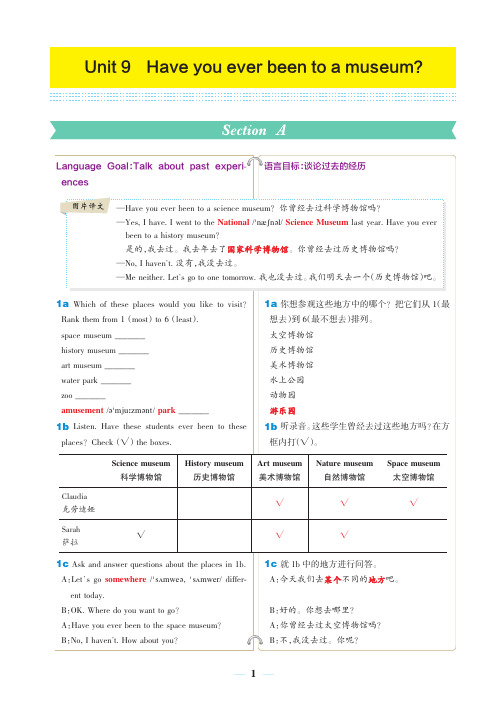
') 6( '%0 G40163&" H)45*'01 I*(0*4- $%0; %&/0 6",)14&'6)" &2)*' +6,,010"' 3)45*'01( &"+ @%) !"#$"%$& !""#$"%& '%04- $%0 )9+ 3)45*'01( @010 4*3% 267701- .'!( '"($)!$#*()$ #$"'!"()%#&*( '%&' '03%")9)7; %&( +,-.,$//$& " +,&'-,./ " +,(%-,$/ 6" (*3% & ,*+!& ",0 @&;< .!/0 &9() 90&1"0+ '%&' '%010 @&( & (5036&9 3)45*'01- .' 3)*9+ 59&; 3%0(( 0/0" 20''01 '%&" %*4&"(- . @)"+01 %)@ 4*3% 4)10 3)45*'01( @699 20 &290 ') +) 6" '%0 ,*'*10!4;! . ! /0 1030"'9; 200" ') & /01; '"'/'*) $" " 12%)2&( 4*(0*4 6" ."+6&J '%0 0"%$,"* %!-"*) #3"%&#$""0*"&( 1'/$'2 -3 4-!)$%/ " %+4(&%- . K*(' 3)*9+" ! ' 20960/0 4; 0;0( @%0" . (&@ () 4&"; +6,,010"' =6"+( ), ')690'( '%010- $%0 4*(0*4 '0&3%0( 50)590 &2)*' '%0 %6(')1; &"+ +0/09)540"' ), ')690'(- .' &9() $" 5-',*.$/ &" " 5$,&6)4 4" " 5,%,46)4 7)/01" 40"'( &"+ /-5!*) " /&'*( 71)*5( ') '%6"= &2)*' @&;( ') 6451)/0 ')690'( 6" '%0 ,*'*10L6"96"!L&(' ;0&1 . @0"' ') '%0 M&"7?%)* N&'6)"&9 $0& I*(0*4- .' ! ( & 109&O6"7 &"+ +$*5$3') "+)%/7( 59&30 "0&1 & 9&=0- $%0 '0& &1' +$,3-, 2*"5$/ +&%,&"7+% % ,&8&"/4 (%)@ %)@ ') 4&=0 & +$,3$5% "+,% % ,&745% 3*5 ), '0& @6'% 20&*'6 ,*9 '0& (0'(- C&'3%6"7 '%0 '0& 5105&1&'6)" 6( K*(' &( 0"K);&290 &( +16"=6"7 '%0 '0& !%/$)3 4%"/.(7- .!/0 ,6"&99; 10&96?0+ @%; 4; 71&"+5& 9)/0( +16"=6"7 '0& &"+ 5-))$5%!". 5& " (.5%- '0& (0'(-
2020年春人教新目标英语八年级下册Unit9-基础知识手册

2020年春人教新目标英语八年级下册Unit 9 Have you ever been to an amusement?短语归纳1.amusement park游乐园2. somewhere different某个不同的地方3. take the subway乘地铁4.have a great time=have fun=enjoy oneself玩得开心,过得愉快5.put up搭建;支起6.learn about了解7. much bigger大得多8.in such a rapid way用如此快速的方式9.even better甚至更好10. end up with sth 以…结束11.many different kinds of许多不同种类的12.argue with sb.与某人争吵13. an English-speaking country 一个说英语的国家14. wake up醒来,叫醒15.in the future在将来,未来16.a couple of两个;一对;几个17.a perfect cup of tea一杯完美的茶18.such as例如19. thousands of数以千计的;许许多多的20. in Southeast Asia 在东南亚21. take a holiday 度假22.on the one hand…on the other hand…一方面…另一方面…23.more than超过,多于24. during the daytime在白天25. all year round=all the year全年,一年到头26. three quarter四分之三27. at night在晚上28. close to... 离……近29.far from离…远30.think of 想起;认为31. rather than 宁可;而不是32.neither…nor…既不……也不……(谓语动词使用就近原则)33. a good place to... 一个…的好地方句型归纳1.a great way to do sth.一个做某事的好方法例:a great way to get there 去那儿的一个好方法2.It is unbelievable that…很难相信…例:It is unbelievable that he failed the exam.很难相信他考试没及格。
英语八年级下册 Unit9 Have you ever been to a museum单元短语过关

人教版英语八年级下册第九单元短语过关Unit 9 Have you ever been to a museum?1. a science museum 一个科学博物馆2. a space museum 一个太空博物馆3. a history museum 一个历史博物馆4.an art museum 一个艺术博物馆5.water park 水上乐园6.amusement park 游乐场7.somewhere different 某个不同的地方;不定副词,后接形容词;例如:For my next vacation , I ‘d like to go somewhere different. 下次度假,我想去个不同的地方。
st year 去年9.at night在夜晚;at noon在中午10.have \ has been to ... 去过...;例如:I have been to a wonderful placewith big gardens. 我去过一个带有很多花园的美景之地。
have \ has gone to ... 去了;例如:She can’t find Mr. Green , he has gone to Beijing. 她不能找到格林先生,他去了北京。
11.go skating 去滑冰12.take the subway 乘坐地铁13.camp in the mountains 在山上野营;例如:During the summervacation , we camped in the mountains and it was fun. 暑假期间,我们在山上野营,非常有趣。
14.put up the tent 搭建帐篷;put up 还可以表示张贴;例如:They putup their tent and slept under the tree.他们搭建好帐篷,在树下睡了。
人教版新目标英语八年级下册:Unit 9《Have you ever been to a museum》知识点梳理及单元复习

Unit 9知识点梳理和单元复习附参考答案1. 单元重点短语归纳:2. Have you ever been to a science museum? 你曾经去过科学博物馆吗?【重点】【辨析】have/has been to;have / has gone to ;have/ has been in;(1). have/ has been to 表示“某人曾经去过某地”强调现在已经回来了,不在那里了。
E.g.: We have been to Qingdao. 我们去过青岛。
(现在不在青岛)(2). have gone to表示“某人到某地去了”,强调现在还没有回来,可能在那里或途中。
E.g.: They have gone to Sydney. 他们去悉尼了。
(现在在悉尼或途中)(3). have been in +地点:表示“某人在某地待了很长时间”,常与时间段搭配。
E.g.: I have been in Nanchang for three years. 我在南昌待了3年了。
How long have you been in China? 你在中国待了多长时间?3. 一般过去时与现在完成时的用法比较【重点】&【难点】(1). 一般过去时表示过去某个时间发生的事、存在的状态或经常发生的动作。
说话的侧重点只是陈述一件过去的事情,不强调对现在产生的影响。
E.g.: He visited Guilin in 1998. 在1998年他参观过桂林。
(只说明去桂林的时间)(2). 现在完成时表示动作发生在过去,对现在造成了影响或产生了结果。
不能与确定的过去时间状语连用。
E.g.: Jill has bought a new computer. 吉尔买了一台新电脑。
I have taught here for fifteen years. 我在这儿教学已经15年了。
I have seen the film. 我看过这部电影。
人教社新目标八年级下英语Unit9_Have_you_ever_been_to_an_amusement_park练习(含答案)
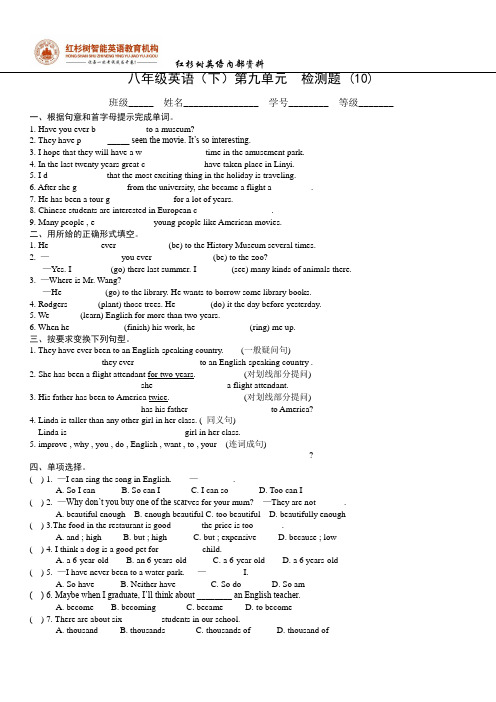
八年级英语(下)第九单元检测题 (10)班级_____ 姓名_______________ 学号________ 等级_______一、根据句意和首字母提示完成单词。
1. Have you ever b___________ to a museum?2. They have p___________ seen the movie. It’s so interesting.3. I hope that they will have a w______________ time in the amusement park.4. In the last twenty years great c_____________ have taken place in Linyi.5. I d_____________ that the most exciting thing in the holiday is traveling.6. After she g___________ from the university, she became a flight a_________.7. He has been a tour g______________ for a lot of years.8. Chinese students are interested in European c_________________.9. Many people , e_____________ young people like American movies.二、用所给的正确形式填空。
1. He ___________ ever ___________ (be) to the History Museum several times.2. —_______________ you ever _____________ (be) to the zoo?—Yes. I ________ (go) there last summer. I _______ (see) many kinds of animals there.3. —Where is Mr. Wang?—He _________ (go) to the library. He wants to borrow some library books.4. Rodgers ______ (plant) those trees. He _______ (do) it the day before yesterday.5. We ______ (learn) English for more than two years.6. When he ____________(finish) his work, he ____________(ring) me up.三、按要求变换下列句型。
人教版英语八年级下册 Unit 9 Have you ever been to a museum
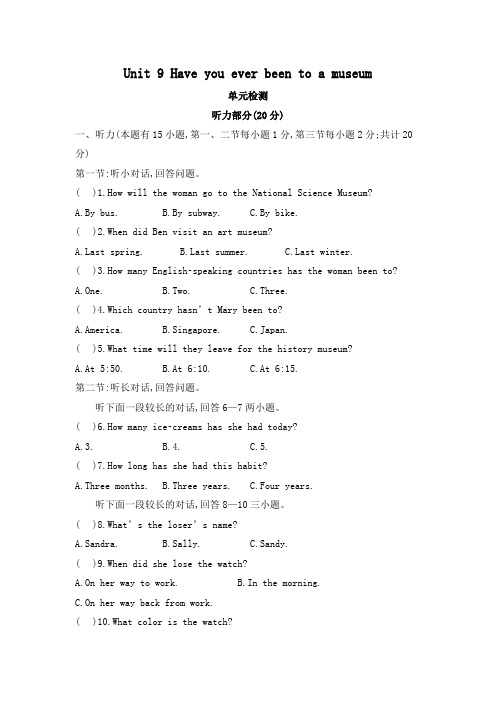
Unit 9 Have you ever been to a museum单元检测听力部分(20分)一、听力(本题有15小题,第一、二节每小题1分,第三节每小题2分;共计20分)第一节:听小对话,回答问题。
( )1.How will the woman go to the National Science Museum?A.By bus.B.By subway.C.By bike.( )2.When did Ben visit an art museum?st spring.st summer.st winter.( )3.How many English⁃speaking countries has the woman been to?A.One.B.Two.C.Three.( )4.Which country hasn’t Mary been to?A.America.B.Singapore.C.Japan.( )5.What time will they leave for the history museum?A.At 5:50.B.At 6:10.C.At 6:15.第二节:听长对话,回答问题。
听下面一段较长的对话,回答6—7两小题。
( )6.How many ice⁃creams has she had today?A.3.B.4.C.5.( )7.How long has she had this habit?A.Three months.B.Three years.C.Four years.听下面一段较长的对话,回答8—10三小题。
( )8.What’s the loser’s name?A.Sandra.B.Sally.C.Sandy.( )9.When did she lose the watch?A.On her way to work.B.In the morning.C.On her way back from work.( )10.What color is the watch?A.Yellow.B.White.C.Black.第三节:听独白,回答问题。
八年级英语下册 Unit 9《Have you ever been to a mus
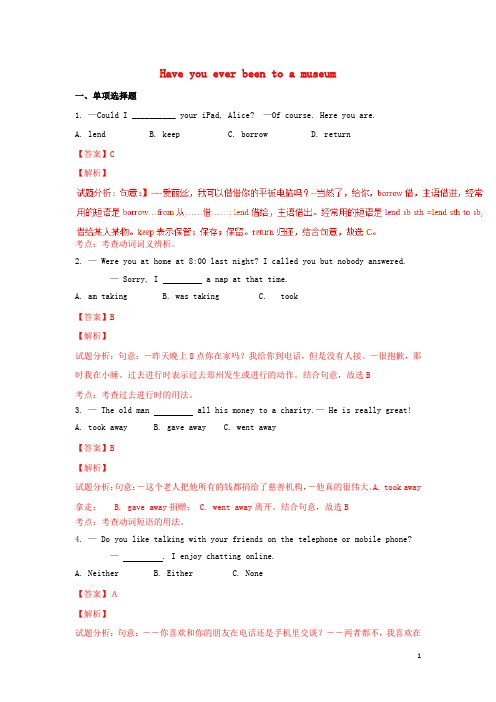
Have you ever been to a museum一、单项选择题1. —Could I __________ your iPad, Alice? —Of course. Here you are.A. lendB. keepC. borrowD. return【答案】C【解析】考点:考查动词词义辨析。
2. — Were you at home at 8:00 last night? I called you but nobody answered.— Sorry, I a nap at that time.A. am takingB. was takingC. took【答案】B【解析】试题分析:句意:―昨天晚上8点你在家吗?我给你到电话,但是没有人接。
―很抱歉,那时我在小睡。
过去进行时表示过去郑州发生或进行的动作。
结合句意,故选B考点:考查过去进行时的用法。
3. — The old man all his money to a charity.— He is really great!A. took awayB. gave awayC. went away【答案】B【解析】试题分析:句意:―这个老人把他所有的钱都捐给了慈善机构,―他真的很伟大。
A. took away 拿走; B. gave away捐赠; C. went away离开。
结合句意,故选B考点:考查动词短语的用法。
4. — Do you like talking with your friends on the telephone or mobile phone?— . I enjoy chatting online.A. NeitherB. EitherC. None【答案】A【解析】试题分析:句意:――你喜欢和你的朋友在电话还是手机里交谈?――两者都不,我喜欢在线交谈。
none 与all 用于三者以上的复数,none 为否定,all 为肯定。
八年级英语下册 Unit 9 Have you ever been to a museum复习 (新版)人教新目标版

Unit 9 Have you ever been to a museum?默写1 Section A 1a~2d一、默写课文中的单词。
1. 照相机;摄影机;摄像机 ______2. amusement n. ______3. somewhere adv. ______4. invention n. ______二、默写课文中的短语。
1. 游乐场 ______2. 去过 ______3. 科学博物馆 ______4. 某个不同的地方 ______5. 太空博物馆 ______6. 玩得很开心 ______7. 了解;获知 ______ 8. 彩色电影 ______9. 电影摄像机 ______ 10. 搭建 ______三、根据汉语提示完成下列句子。
1. 你曾经去过一家科学博物馆吗?______ you ______ ______ ______ a science museum?2. 弗兰克在水上公园玩得很开心。
Frank ______ ______ ______ ______ at the water park.3. 约翰从没有去过太空博物馆。
John ______ ______ ______ ______ the space museum.4. 你曾经去过那儿吗?Have you ever ______ ______ ?5. 它是一个度过周六下午的好方式。
It’s a great way ______ ______ a Saturday afternoon.6. 我还了解一些发明,它们成就了彩色电影。
I learned about the inventions that ______ ______ color movies, too.7. 我从未野营过。
I’ve never ______ ______ .知识积累somewhere与 anywhere的用法辨析:相同点:都表示“在某处”。
不同点:somewhere多用于肯定句中;anywhere多用于疑问句和否定句中。
人教版八年级英语下册Unit9知识点归纳

人教版八年级英语下册Unit9知识点归纳Unit 9: Have you ever been to a museum。
Knowledge Points Summary1.Key Phrases:At night: during the nightIn a more natural environment: in a setting that is more naturalAll year round: XXXXXX: XXXIn the dark: in a place without lightIn the past: in us timesHave been to: visited a placeScience museum: a museum focused on scienceHistory museum: a museum focused on historyXXX park: XXXGo XXX: visit a place that is not familiarGo skating: ice skateTake the subway: XXX systemA great way to XXXAll the old movie cameras: all the antique movie cameras Learn about something: gain knowledge about a topic On the weekend: during the weekendXXX: sleep in a tent in the mountainsPut up a tent: assemble a XXXIn such a rapid way: in a very fast mannerDifferent kinds of: us types ofDevelopment of toilets: the progress of XXXSocial groups: XXXXXX XXX: XXXMake a perfect cup of tea with beautiful tea sets: XXXA nice place to XXXXXX of: many。
八年级英语下册Unit9Haveyoueverbeentoamuseum英语说课稿

八年级英语下册Unit+9+Have+you+ever+been+to+a+museum英语说课稿一、教材分析:1、教学内容:本单元是Go for it ( 下) Unit 9。
主要围绕“Have you ever been to a museum?”这一主题展开各种教学活动,并以这一主题引出现在完成时的一般疑问句,否定句以及特殊疑问句等语言功能。
本单元旨在创造一个轻松、愉快的学习、交流环境,通过听、说、读、写来培养学生综合运用这些知识的能力。
并让学生能在“做中学”(l earning by doing),通过有限的课堂实践活动,拓展以往的经历,能准确地用英语来表达。
2、教材的地位和作用:八年级下九单元Have you ever been to a museum?讲述的是现在完成时的用法,这是初中非常重要的时态之一。
学生们能够用现在完成时来表达自己的经历,来体会别人的感受是很重要的。
这个单元一定要体会现在完成时的真正含义和用法。
要避免混淆几个重点词组的使用。
我们更要使学生不仅理解枯燥的语法,还要让学生们会用新学的语法知识来表达思想。
3、教材的处理:根据《英语课程标准》(实验稿)关于总目标的具体描述,结合本单元这部分的教学内容及基于对教材的分析,我对本单元的内容进行如下处理,目的是突出重点,使课堂节奏紧凑,衔贯。
本单元分为四课时,第一课时是Section A,第二课时是Section B, 第三课时是Self Check, 第四课时是Reading,最后一部分是做练习,以学生的自测为主,然后予以校对。
二、教学目标:根据以上我对本单元教材内容的分析,我确定以下几个为本单元的教学目标:语言知识、语言技能、学习策略、情感态度和文化意识五个方面。
§1.语言知识:本单元要求学生掌握以下词汇(neither, theme, end up, especially, disc over, population, simply, fear, whenever)语言功能:学习和增加阅读技巧和阅读策略。
- 1、下载文档前请自行甄别文档内容的完整性,平台不提供额外的编辑、内容补充、找答案等附加服务。
- 2、"仅部分预览"的文档,不可在线预览部分如存在完整性等问题,可反馈申请退款(可完整预览的文档不适用该条件!)。
- 3、如文档侵犯您的权益,请联系客服反馈,我们会尽快为您处理(人工客服工作时间:9:00-18:30)。
here. He went to the Palace Museum last week. There are so m_a_n_y_____ beautiful _t_re_a_su_r_e_s_. He also __ha_s_b_e_e_n_t_o_ the
Tip1 : pay attention to the key words.
1c Listen again and take notes. Name: __________P_e_te_r_________________ Country: _______________A_u_s_t_ra_l_ia_______ How long in China: _____tw__o_w__e_e_k_s_______
b
c
d a
__c__ the Terracotta Army __a__ the Great Wall
__d__ the Bird’s Nest __b__ the Palace Museum
1b Listen to a student interviewing a foreign student. Check (√) the questions you hear.
Have you ever been to …?
Have you visited …? Do you want to visit …?
1a
Match the pictures with names. Q1: Where is …?
Q2 :Have you ever been to/ visited…?
4. --- I've bought a new MP4.
--- Where __d_id__ you _b_u_y__ it? (buy)
--- In a shopping mall near here. 5. --- Where is your mother?
--- She _h_a_s_g_o_n__e__ (go) to Shanghai with Uncle Li. She _w__i_ll__c_o_m_e__ (come)
What places have you been to? Ask your 1d
partner.
Have you visited …? Have you been to …? Have you seen …? Have you tried …?
Exercise
一、单项选择。
1. Linda _C__ the space museum after school
A. always B. ever
C. never
4. —_A__ did you start skating?—Five years ago.
A. When B. How long C. How often
二、用所给词的适当形式填空。
1. --- Where _h_a_v_e_ you _b_e_e_n_ (be)? --- I _h_a_v_e_b_e_e_n__ (be) to the library.
2. --- How many times _h_a_v_e_ you _b_e_en_ (be) to Beijing?
--- Twice. 3. Daniel _h_a_s__ never _b_e_e_n_ (be) to
Australia. He wants to go there with Mike.
back in three days.
6. We _h_a_v_e_n_'t_f_i_n_is_h_e_d__ (finish, not) our homework yet. Will you wait a minute?
7. John _h_a_s_n_'t_c_o_m__e___ (come, not) yet. He will be back in a minute.
the Palace Museum, Places visited: ________________________ _t_h_e_G_r_e_a_t_W__al_l_,_t_h_e_B_i_r_d_’s_N__e_st_,_t_h_e________ _T_e_r_ra_c_o_t_ta_A__r_m_y________________________
Unit 9 Have you ever been to a museum?
Section B (1a-1d)
Lead in
Shanxi province the Terracotta Amy
Beijing
the Great Wall the Bird’s Nest the Palace Museum
Great Wall and the Bird’s Nest. He thinks the Terracotta Army in Xi’an is very f_a_n_ta_s_ti_c__. He loves _C_h_i_n_es_e_f_o_o_d__ very much. Hisfa_v_o_ri_te___ dish is Beijing Duck.
8. Mr. Green often goes to America. In fact, he _h_a_s_b_e_e_n___ (be) there ten times.
9. He _h_a_s_n_e_v_e_r_t_ra_v_e_l_e_d___ (travel, never) on a train in his life.
1. To know some famous places in China
2. To listen for specific information 3. To learn to use the present perfect
tense Have you visited…? Have you been to…? Have you seen…?
√ ____ Have you visited the Palace Museum? _√___ Have you been to the Great Wall? ____ Have you been to the Bird’s Nest? ____ Have you seen the Terracotta Army? _√___ Have you tried Chinese food?
Homework
Write an article to advertise your hometown or a place you have been to.
Have you ever tried /seen /been…? If you …, you will /can… You should … One great thing about… is…
yesterday.
A. has been to B. was going to C. went to
2. You don't need to describe her. I _C__ her several
times.
A. meet
B. will meet C. have met
3. Have you _B__ heard of Disneyland?
Food: ______________B_e_i_ji_n_g_D__u_ck________
Tip 1: circle the key words.
Listen again and fill in the blanks. Peter ___h_a_s_b_e_enin China for two weeks. He _i_s_g_o_in_g_ back to
